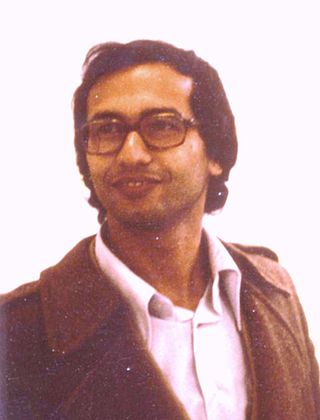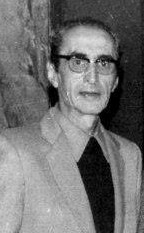Mustapha Haciane | |
|---|---|
 | |
| Born | 1935 |
Mustapha Haciane, also spelt as Mustafa Haciane, [1] [2] (born in 1935) is an Algerian novelist, playwright, and poet. [3] His publications often tackle social issues. [4]
Mustapha Haciane | |
|---|---|
 | |
| Born | 1935 |
Mustapha Haciane, also spelt as Mustafa Haciane, [1] [2] (born in 1935) is an Algerian novelist, playwright, and poet. [3] His publications often tackle social issues. [4]
Mustapha Haciane was born in 1935, in Rouiba, Algeria, into a family of Turkish origin. [5] [3] He began writing poems at the age of 17 whilst in high school. In 1950 he met with Albert Camus, and continued his studies in France and Switzerland. [5]
During his travels, Haciane wrote the play "A quoi bon fixer le soleil" ("What is the point of fixing the sun") which was performed in Geneva in 1967 at the Theatre de l'Atelier. [5]
Back in Algeria he wrote two other pieces: "La Vocation de l'abus" ("The Vocation of Abuse") and "L'Escalier d'en face" ("The Staircase opposite"). [5]
In Rio de Janeiro he wrote Les Orphelins de l'Empereur ("The Orphans of the Emperor"). [5]

Shawiya, or Shawiya Berber, also spelt Chaouïa, is a Zenati Berber language spoken in Algeria by the Shawiya people. The language's primary speech area is the Awras Mountains in Eastern Algeria and the surrounding areas, including parts of Western Tunisia, including Batna, Khenchela, Sétif, Oum El Bouaghi, Souk Ahras, Tébessa and the northern part of Biskra. It is closely related to the Shenwa language of Central Algeria.

Tahar Djaout was an Algerian journalist, poet, and fiction writer. He was assassinated in 1993 by the Armed Islamic Group.

Salim Jay is a Franco-Moroccan novelist, essayist and literary critic living in France. He has written about 20 books, numerous essays and more than thousand newspaper articles.

Slaheddine Baccouche was a Tunisian politician. He served as grand vizier of Tunis under Muhammad VIII al-Amin, from 1943 to 1947 and again from 1952 to 1954. His nephew was the writer Hachemi Baccouche.
Mohamed Bencheneb was an Algerian professor, writer and historian.
Noureddine Aba was an Algerian poet and playwright. His work mainly focuses on political themes, such as the Algerian revolution, the Arab–Israeli conflict and Nazi Germany. In 1990, he established the Fondation Noureddine Aba, which continues to present the annual Noureddine Aba Prize to Algerian writers.

Mohamed Temam or Mohamed Temmam was Algerian miniaturist painter and illuminator.
Sid Ali Kouiret was an Algerian actor.
Algerians in France are people of Algerian descent or nationality living in France. People of Algerian origin account for a large sector of the total population in France. Some immigrated during colonial rule in Algeria starting in the 1920s, and large numbers chose to emigrate to France from the 1960s onwards due to political turmoil in Algeria.
Mohand Tazerout was an Algerian philosopher, writer, translator and Algerian civilizationist. He translated several works of German philosophers including The Decline of the West by Oswald Spengler in 1931, and wrote many books, including several commentaries on Soviet communism, and a political history of northern Africa.
Rabah Belamri was an Algerian writer.

Djamel Amrani was an Algerian writer of French expression.

Arezki Metref, is an Algerian writer, poet and journalist.
Djamila Debèche, sometimes written Debêche or Debbeche, was French-Algerian feminist writer. She was a pioneering journalist and novelist in Algeria, where she was one of the first women writers of the French colonial period.
Zawiyet Sidi Amar Cherif, or Zawiyet Sidi Daoud, is a zawiya school located in Boumerdès Province in Algeria.
Ahmed Mahsas was an Algerian militant in the nationalist movement against French Algeria.
Mustapha Bouchelaghem, also known as Bey Bouchelaghem was the Bey of the Western Beylik from 1686 to 1734/37.
Omar Fetmouche is an Algerian artist, actor and playwright.